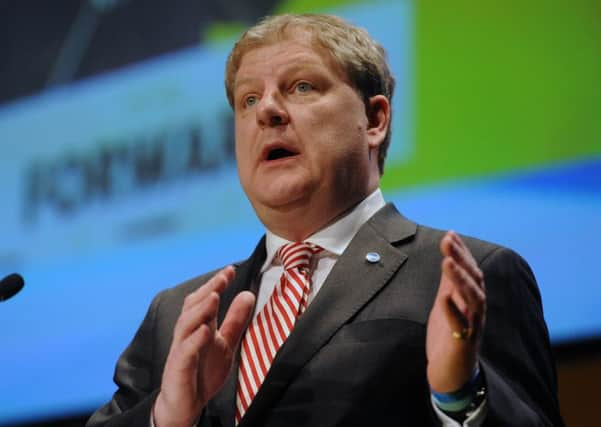Tommy Sheppard: SNP depute contest is decidedly dignified


We’re pretty much halfway now in the ten-week campaign to find a new depute leader of Scotland’s main political party. And in stark contrast to other parties, the SNP contest seems a positive and good-natured one.
Sadly, there are no women in contention, but members do have a choice of four able blokes – any of whom could make a decent fist of the job.
Advertisement
Hide AdAdvertisement
Hide AdLeast known is Chris McEleny the youthful leader of the SNP group on Inverclyde Council. A passionate republican, he is articulate and makes the not unreasonable point that – given the SNP’s presence in city chambers and town halls throughout the country – local government ought to have a seat at the top table.
Alyn Smith has been Scotland’s main man in Europe for 13 years. Now that Brexit has turned the world upside down he argues that our emerging relations with other EU countries are of paramount importance – and no-one has better experience than he at cementing them.
Best known of the contenders is Angus Robertson, the party’s formidable leader at Westminster who demonstrates weekly that he can provide more of an alternative to the Tory government than the unfortunate ranks of HM’s loyal Opposition.
And then there’s me. This is not the place to tell you what I stand for – check out tommysheppardmp.scot if you’re interested. The point, though, is that with a focus on internal reorganisation, it’s again a different pitch. So, four candidates, four different prospectuses on what needs doing. In many ways, members will have to choose not just who they think could do the job best – but what job needs to be done.
And it will be the members alone who decide. In the SNP any member can stand for the leadership – and every member can vote. Quaint, huh? We call it democracy.
And that is what has been going on – relatively unnoticed by anyone else – for the last couple of months up and down the country. Individual members have packed into community halls and hotel function rooms to hear and quiz the candidates.
Anyone who joined at the time the contest was declared will get a vote when the ballot papers go out on 21 September. No-one will ask if they used to support another party. We regard it as something of a positive step if we can persuade someone to support the SNP when they used to support someone else. And no-one will be disbarred for tweeting that they like the Foo Fighters, which some Labour apparatchik presumably mistook for a bunch of jihadis rather than rockers.
Much of the media, including a few correspondents for this august organ, like to suggest that the SNP is some centralist autocratic monolith with policies handed down from above and dissent forbidden. Now, I’ve read the online comments which follow articles like this and I know some of you won’t like this, but… It’s not true. And as I write that last sentence I know some people will be dashing for the keyboard to rubbish my views online. Some will say that I would say that, wouldn’t I? Others that I am deluding myself – that the fact I would deny something is proof that it exists. A very modern witchcraft.
Advertisement
Hide AdAdvertisement
Hide AdBut it isn’t. And, to prove it, just have a look. There are four different candidates for this job, different views, and different outlooks. They are being quizzed nightly on topics ranging from the Monarchy to paid regional organisers. And they give different answers.
The manner of the discourse is different, though. I’m the oldest of the candidates and old enough to have been a young Labour activist in the Bennite campaigns of the early Eighties. People in the Labour Party have always taken chunks out of each other – I think perhaps because the party was always an alliance of distinct groupings since its inception. Of course, the internal fights of the Eighties seem like a teddy bears’ picnic compared to the mass self-harm exercise which is Labour today.
The SNP operates differently. There is a genuine respect for alternative views within the party, and although, of course, we are wary of advertising our differences in the glare of an often hostile media, we are not shy about debating and resolving them. The SNP, too, is a broad church, a coalition of many with differing views. There are two differences, though. Firstly, there aren’t really any factions so the amalgam is one of thousands of individuals rather than several organised groups. And secondly, despite differences which might exist on various policies there is an overarching narrative – the ambition for Scotland to become a self-governing independent nation offers a commanding rubric to resolve differences on other things.
The SNP has grown dramatically in recent years. Tens of thousands have joined to campaign for progressive change. And there have been remarkable electoral successes. Yet, again perhaps to confound hostile observers, there is a sense of humility rather than arrogance in the organisation. The questions we face at hustings are not phrased as demands to accelerate the date of the next independence referendum. Rather, people ask why we think we lost. What would you do differently? How do we reach out to those who voted No?
We have another 20 or so hustings events coming up this month where we will discuss these questions with thousands of our members. And at the end of the day we’ll get ourselves a new depute leader whom everyone will support. More importantly, as a party we will emerge stronger for having gone through this process. I fear the exercise that our Labour colleagues are undertaking in parallel will have nothing like as positive a result.
• Tommy Sheppard is SNP MP for Edinburgh East